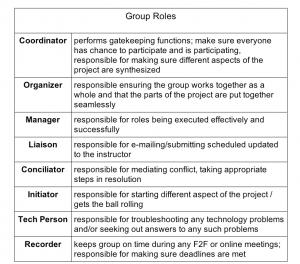Description
While students may express a desire for more student-centered collaboration in the discussions, they may not fully understand the responsibility required to achieve it (Kanuka et al., 2007). Along with a thoughtful discussion prompt, facilitation during the discussion is often necessary to support students to engage in critical discourse (DeSmet et al., 2008; Maurino et al., 2007). Typically, the facilitator role is fulfilled by the instructor, but there are other options as well.
Examples
- Instructor facilitator: Research studies concerning instructor-facilitated discussions have reported varying levels of success, due to factors such as their participation frequency and facilitation style. It is tempting for an instructor to be very active and respond to each student post, but that has been shown to reduce the number of posts composed by students, shutting down student interaction (Dennen, 2005; Mazzolini & Maddison, 2007).
- Guest expert: To open up the classroom topic, it is helpful to invite guest speakers to log in and discuss. It is important to keep the discussion structured and focused, with the emphasis being on students interacting with each other.
- Fourth-year or Graduate-level: Past research suggests that students may feel intimidated by the presence of the instructor and consequently less confident about expressing their ideas (Seo, 2007). It may be helpful to have fourth-year undergraduates or graduate-level students facilitate the discussion, since they have more content knowledge but are not the instructor. It is important that they are clear on their facilitation roles and guided by the instructor (Paulus, Horvitz, & Shi, 2006).
- Peers: Although students possess less content knowledge than the instructor or graduate-level students, many researchers have found that peer facilitators can promote active learning and meaningful discussions (Baran & Correira, 2009; Gilbert & Dabbagh, 2005; Rourke & Anderson, 2002). However, peers will need guidance in order to skillfully facilitate. It is helpful to give peers explicit guidance/expectations about facilitating along with a rubric to evaluate their performance as facilitators (Gilbert & Dabbagh, 2005). It is suggested that the instructor models this activity for the first few weeks to show peers what a facilitator does. It is important that the instructor remains “in the loop” about the progression of discussion in case expert clarification is needed.
- Teams: Another idea is to have peers lead in teams, or having a peer-instructor team facilitate. Rourke and Anderson (2002) studied whether peer teams can facilitate discussion as effectively as the instructor. In one condition, the instructor facilitated the discussions, while the other condition primarily featured the peer team facilitating, while the instructor remained to clarify subject content issues. The students preferred the peer-led teams.
Instructor Example
- Instructor: Ms. Susan Jardaneh
- Course: IDS3933 – Cornerstone Experience in Interdisciplinary Studies

Ms Susan Jardaneh organized group discussion activities in online courses
Link to scholarly reference(s)
Baran, E., & Correria, A. (2009). Student-led facilitation strategies in online discussions. Distance Education, 30, 339-361.
Dennen, V.P. (2005). From message posting to learning dialogues: Factors affecting learner participation in asynchronous discussion. Distance Education, 26, 127-148.
De Smet, M., Van Keer, H., & Valcke, M. (2008). Blending asynchronous discussion groups and peer tutoring in higher education: An exploratory study of online peer tutoring behaviour. Computers & Education, 50, 207-223.
Gilbert, P.K., & Dabbagh, N. (2005). How to structure online discussions for meaningful discourse: A case study. British Journal of Educational Technology, 36, 5-18.
Kanuka, H., Rourke, L., & Laflamme, E. (2007). The influence of instructional methods on the quality of online discussion. British Journal of Educational Technology, 38, 260-271.
Maurino, P., Federman, F., & Greenwald, L. (2007). Online threaded discussions: Purposes, goals, and objectives. Journal of Educational Technology Systems, 36, 129-143.
Mazzolini, M., & Maddison, M. (2007). When to jump in: The role of the instructor in online discussion forums. Computers & Education, 49, 193-213.
Paulus, T.M., Horvitz, B., & Shi, M. (2006). ‘Isn’t it just like our situation?’ Engagement and learning in an online story-based environment. Educational Technology Research and Development, 54, 355-385.
Rourke, L., & Anderson, T. (2002). Using peer teams to lead online discussions. Journal of Interactive Media in Education, 1, 1-21. Retrieved from https://jime.open.ac.uk/articles/10.5334/2002-1/
Seo, K. (2007). Utilizing peer moderating in online discussions: Addressing the controversy between teacher moderation and nonmoderation. American Journal of Distance Education, 21, 21-36.
Contributors
Submitted by Aimee deNoyelles Aimee DeNoyelles and Baiyun Chen